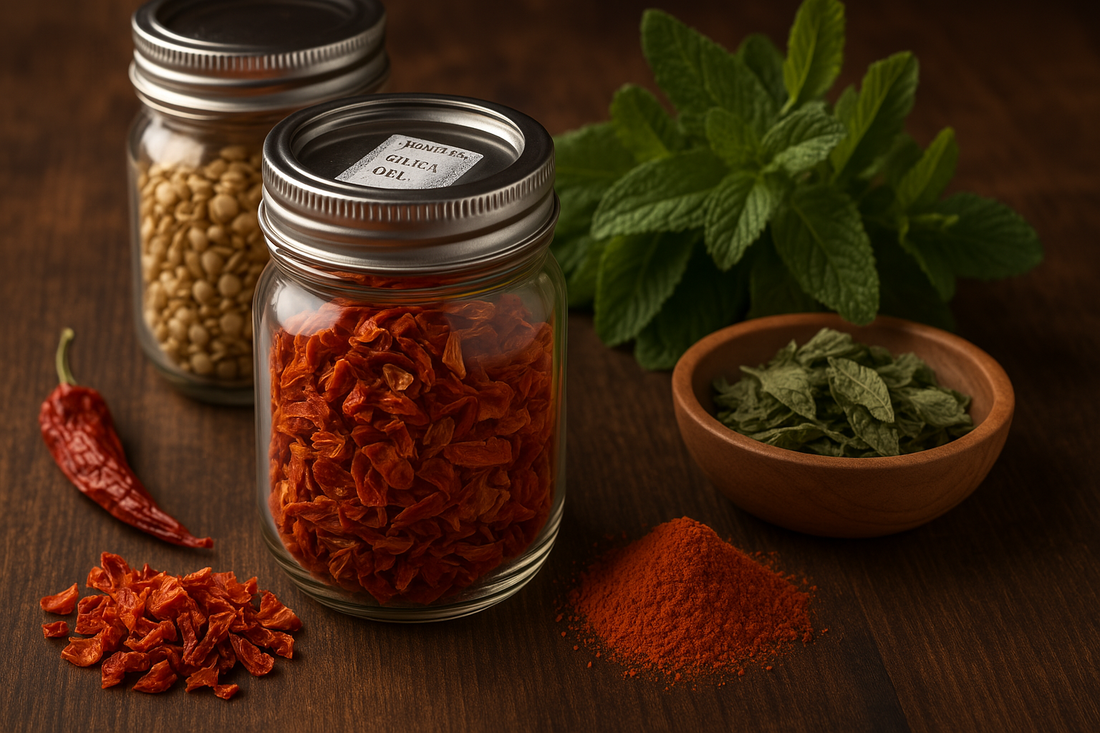
The Hidden Benefits of Homegrown Food: Unlocking the Power of Dehydration
Many people grow food at home for fresh produce, but that’s just the beginning. Beyond harvesting and eating, dehydration allows us to get even more out of our homegrown plants—preserving flavors, saving seeds, and crafting homemade seasonings that elevate everyday cooking.

The Best Storage Method: Silica Pack vs. Oxygen Absorber
When storing dehydrated foods, you’ll want them to remain fresh and safe for as long as possible. Here’s how different storage aids work:
- Silica Packs: Absorb moisture, preventing mold and clumping.
- Oxygen Absorbers: Remove oxygen to prevent spoilage and extend shelf life.
- Using Both: Combining silica packs and oxygen absorbers ensures optimal dryness and longevity.

From Whole to Powder: Transforming Dehydrated Foods
Your dehydrated peppers and herbs aren’t just for storage. Once fully dried, you can grind them into powders for custom spice blends:
- Dried chili peppers become homemade paprika or cayenne powder.
- Dried garlic & onion can be ground into powders for seasoning blends.
- Dehydrated basil, oregano, thyme become concentrated flavors for soups and marinades.
- Lemon balm leaves—perfect for homemade teas for relaxation and digestion.

The Tools That Make It Happen: Dehydrators & Grinders
Having the right tools makes dehydration and grinding efficient and effective:
- Dehydrators: These appliances help evenly dry out food, preserving its flavor and nutrients. Electric dehydrators with adjustable temperature settings are the best for consistent results.
- Grinders: A spice grinder or food processor quickly turns dried herbs, peppers, and garlic into fine powders for seasoning blends.
With these tools, you can create homemade spices, teas, and seasonings while maximizing the value of your harvest.

Commonly Dehydrated Homegrown Plants
Here’s a list of easy-to-grow plants that benefit from dehydration:
- Peppers (for seeds, powders, and spice blends)
- Tomatoes (for soups, stews, and sauces)
- Garlic & Onions (for homemade seasonings)
- Lemon Balm & Mint (for teas and medicinal uses)
Conclusion: Embrace the Full Potential of Homegrown Food
Growing your own food isn’t just about having fresh produce—it’s about unlocking its full potential. Through dehydration, seed-saving, and crafting homemade spices, teas, and seasonings, every harvest can give you far more than what meets the eye. Whether you’re preserving flavors, maximizing storage, or repurposing every part of a plant, these methods make homegrown food even more rewarding. So why not take the next step? Start growing, drying, and grinding today, and transform your garden into a year-round source of nourishment and creativity!


